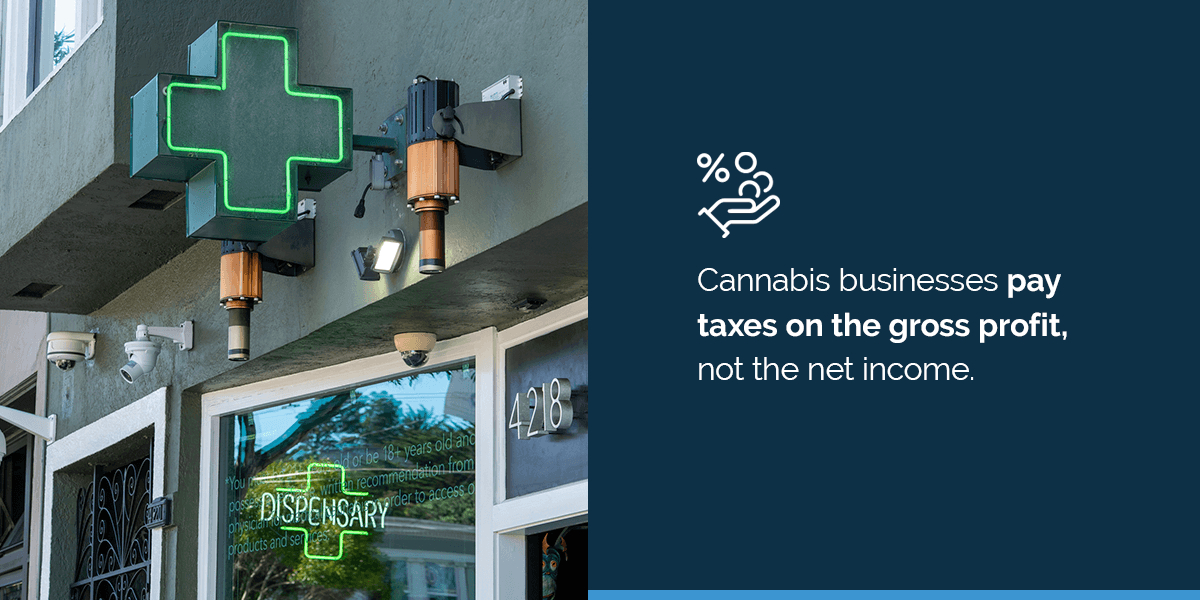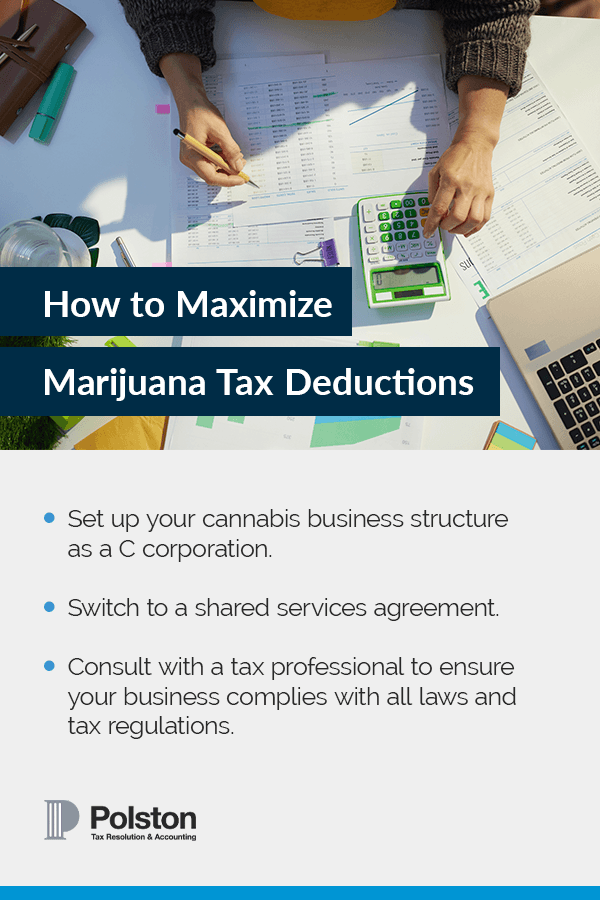Running a legitimate cannabis business can be tricky since marijuana is still illegal under federal law. Currently, 24 states plus the District of Columbia have legalized the recreational use of marijuana, and 14 other states allow it for medical use only. Projections estimate revenue to reach $42.98 billion in 2024 in the United States. Yet, federal law classifies marijuana as a Schedule I controlled substance. These substances are approved for research purposely only. Thus, businesses that deal with them, even in states where they are legal, will face some challenges.
One of the primary roadblocks cannabis businesses face is taxation. The IRS has imposed strict rules, forcing such companies to pay more taxes. Cannabis businesses are also often audited. These businesses must understand the cannabis tax laws to ensure compliance. There are some financial benefits as well. Learn more about taxes for marijuana businesses in this complete guide.
The 280E tax code came into law in 1981 when Ronald Reagan declared a war on drugs. This was the same year the Tax Court ruled in Jeffrey Edmondson vs. Commissioner that a convicted drug trafficker could deduct ordinary business expenses from their taxable income. A year later, the decision was overturned.
Currently, businesses selling Schedule I and Schedule II controlled substances cannot deduct business expenses. The only deductible expenses are the cost of goods sold (COGS). COGS are those directly related to the production of the product and vary depending on whether a business is a producer or a reseller. For producers or cultivators, COGS can include soil, seeds, utilities and labor directly related to caring for the plants. For resellers or retailers, COGS only include costs directly related to procuring or transporting merchandise.
The Controlled Substance Act (CSA) defines a controlled substance as one that has no medical use but has the potential for abuse.
Under federal law, Marijuana is a Schedule I controlled substance, making it illegal. Despite legalization in some form in more than 50% of the states, the federal government considers any cannabis business to be drug trafficking. Businesses selling cannabis can deduct the COGS but not business expenses.
Section 280E of the tax code allows businesses to deduct the COGS, even if the product is illegal. The exclusion covers inventory costs, like the expenses incurred in shipping products from the manufacturing facility to a retail location, and related expenses.
The IRS side-steps tax laws coming into effect following the enactment of 280E, which would allow the deduction of indirect costs. Expenses incurred during the distribution process are not allowable under the cost of goods sold. Other non-deductible expenses include the following:
For producers, the allowable cost of goods deductions only applies to purchasing cannabis seeds and the soil, water and nutrients necessary for planting and cultivating the product. Retailers can deduct even fewer expenses.
Cannabis businesses pay taxes on the gross profit, not the net income. Putting that into perspective, you will pay more taxes than a non-cannabis business generating the same amount of revenue. This is because the only allowable deduction for cannabis businesses is the COGS. Other businesses deduct their COGS plus additional expenses, including employee salaries, benefits, utilities and rent. The loss of these deductions significantly impacts the cannabis business’s taxable income.

The tax implications can affect other aspects of your business. For example, paying more taxes means increased operating costs, which can reduce your cash flow. Also, high taxes can affect pricing strategies. Companies with high profit margins can offer competitive prices and drive growth.
Furthermore, cannabis businesses have an added compliance burden. You must adhere to the ever-changing and complex regulations, which can be challenging and time-consuming.

Proper accounting practices and compliance can help you pay fewer business taxes.
First, set up your cannabis business structure as a C corporation. Under this structure, you pay taxes only on salaries and dividends. Second, you may want to switch to a shared services agreement. This means dividing the business into two entities. The first will be responsible for producing and distributing cannabis. The second business will handle all legal responsibilities, like managing the retail space, selling related merchandise, care and counseling.
The first business producing and distributing must comply with Section 280E tax code and the cost of goods sold requirement. The second business can take all regular deductions for payroll, utilities, rent, administration, promotion, marketing and sales. This structure can help you reduce your tax liability.
It’s best to consult with a tax professional to ensure your business complies with all laws and tax regulations. They have legal knowledge of how to develop a compliant business structure.
You must provide accurate reports about your employee salaries to ensure tax code compliance. To fulfill this obligation, you must designate each employee’s position in the company and pay them accordingly. This is because an employee who works part-time as a cultivator will fall under a different tax code than a part-time budtender.
If one employee takes on several tasks, you need to track their time separately for each task. This determines how many hours you can deduct under Section 280E.
Cannabis business taxation in some selected states is as follows:
Alaska approved cannabis legalization with Ballot Measure 2 in 2014. In 2016, the tax agency issued the first cultivation license, and retail sales started that same year. The state collects excise taxes as follows:
The Licensing and Tracking Marijuana Control Board and the Alaska Department of Revenue handle tax administration.
Licensing of retail cannabis businesses began on January 16, 2021. Marijuana sales are taxed at 16%, in addition to a transaction privilege tax and a use tax. Regulation administration is under the Arizona Department of Health Services, and taxes are under the Department of Revenue.
In California, personal use and growing became legal in November 2016, with retail sales starting in January 2018. Taxes on cannabis businesses include:
The Department of Cannabis Control regulates and licenses all cannabis activity in the state.
Colorado was the first state to approve cannabis retail sales in January 2014. The legislature legalized marijuana back in 2012. Taxes on these businesses are:
Colorado Department of Revenue is the administering agency.
The possession and use of up to 1.5 ounces of cannabis has been legal in Connecticut since July 1, 2021. Retail sales also commenced in January 2023. The cannabis taxation rates are:
The agencies administering control in this state are the Connecticut Department of Consumer Protection and the Connecticut Department of Revenue Services.
The State of Illinois approved sales from licensed dispensaries in January 2020. Taxes being administered are:
The agencies administering control are the Illinois Department of Financial and Professional Regulation and the Illinois Department of Revenue.
Retail sales of marijuana began on October 9, 2020. Taxes in the state are:
The Office of Marijuana Policy, Main Department Administrative and Financial Services, and Main Revenue Service administer the regulations.
The state issued the first cultivation license on June 21, 2018. November 20, 2018, was the opening of the first retail store. Cannabis business taxes are:
The Massachusetts Cannabis Control Commission and the Massachusetts Department of Revenue administer the regulations.
Retail sales began on December 6, 2019. The state has a 10% retail excise tax and a 6% state sales tax. The Michigan Department of Licensing and Regulatory Affairs and the Michigan Department of Treasury are responsible for tax administration.
The state legalized the sale of recreational marijuana in February 2023. There is a 6% tax on retail sales for recreational use at dispensary facilities and a 4% tax on retail sales for medical use. The Missouri Department of Revenue regulates cannabis taxation in the state.
Retail sales of marijuana began in 2022, with the state having the following taxes:
The Montana Department of Revenue regulates the cultivation, transportation, manufacturing and sale of cannabis. The agency accepts applications for licenses. When you can apply depends on whether you previously held a license or are a new applicant.
With sales beginning July 1, 2017, the following taxes apply in Nevada:
The Nevada Department of Taxation monitors regulations.
Recreational retail sales of marijuana began in April 2022. The state imposes a 12% retail sales excise tax that increases annually starting in 2025 to a total of 18% in 2030. The Cannabis Control Division of the Regulation and Licensing Department will be responsible for licensing and collecting taxes.
The state approved the Marijuana Legalization Amendment in 2020, and retail sales began in April 2022. There is an applicable 6.625% sales tax on recreational marijuana plus a social equity excise fee of one-third of 1%. The Cannabis Regulatory Commission oversees the regulation of the processing, cultivation and sale of marijuana.
Recreational marijuana sales began in 2022. As of June 1, 2024, taxes will no longer be based on THC potency. Instead, the sales tax will be 9% for adult-use products, and the excise tax will range from 3.25% to 7% for medical-use cannabis.
The New York State Department of Taxation and Finance will oversee licensing, tracking and taxes.
Retail sales at medical dispensaries began in October 2015, with recreational marijuana sales starting in October 2016. Taxes that apply are:
The Oregon Liquor Control Commission and the Oregon Department of Revenue handle regulations.
In November 2021, the South Dakota Supreme Court ruled that a state constitutional amendment legalizing recreational marijuana is unconstitutional. In other words, the court rendered the use and possession of marijuana illegal in the state. However, the law still permits cannabis for medical use.
The state applies sales and use taxes to the gross profit at a 4.2% rate. Municipal taxes also apply when customers possess cannabis within city limits. The South Dakota Department of Revenue oversees tax regulation.
The legislature has passed a law to allow the recreational use of marijuana. However, the governor has yet to approve the bill. The bill proposes a 21% retail sales tax on all products sold through marijuana stores plus an optional 3% local sales tax. The Virginia Cannabis Control Authority will oversee all regulatory activities.
Washington was the second state to approve retail sales of medical marijuana and licensing of dispensaries as of June 2016. There is a 37% tax on retail sales and a 6.5% retail sales tax plus any local taxes. Medical marijuana is exempt from sales taxes. The Washington State Liquor and Cannabis Board handles licensing, tracking and taxes.
Cannabis businesses generate substantial federal tax revenue, making them prime targets for IRS audits. Although the IRS has published audit techniques guides (ATGs), companies still consult tax consulting agencies for assistance. The reason is that the IRS audit guides are complex. Running a successful business while reviewing the ever-changing codes can be herculean. Thus, it makes business sense to hire an experienced cannabis tax professional to help you set up an accounting program and prepare accurate tax returns.
Hiring a tax professional can ensure a successful audit and take the load off your shoulders. The goal is to develop strategies that can help you save money and drive growth.

Let’s address the frequently asked questions regarding cannabis business taxation in the U.S.:
Cannabis excise tax is an indirect tax imposed on the sale of marijuana. They are often levied at the state level and could either be a percentage of the retail price or a flat rate per unit of weight, such as per ounce of cannabis flower or gram of concentrate.
Yes, marijuana dispensaries pay federal taxes. However, there are limited allowable deductions compared to other businesses. Since federal law treats cannabis as illegal, only the cost of goods sold is deductible. Ordinary business expenses are not deductible.
Cannabis dispensaries must report their earnings to the IRS. This obligation applies to both cash and online transactions. Similarly to any other business, cannabis businesses file tax returns annually and pay the taxes owed.
At Polston Tax Resolution and Accounting, we understand how challenging it can be to navigate the strict and complex cannabis taxation laws. Our years of experience have allowed us to appreciate different business perspectives and client needs, which we leverage to provide tailored services. For years, we have helped businesses develop practical strategies, improving their financial situations and helping them flourish.
We have experienced tax professionals, from tax attorneys and certified public accountants to tax preparers, case managers and enrolled agents. Our team has access to enormous resources to provide end-to-end services. We offer efficient tax solutions at a competitive rate.
Our commitment to supporting businesses has won us several awards and recognitions. Amidst all these successes, we find ways to give back to the community. Our goal of building strong, lasting relationships and making real impacts remains a top priority.
Running a business in such an uncertain industry can be challenging. One of the best business decisions you can make is hiring a cannabis tax professional to handle that aspect of your business. Polston Tax has over 100 years of combined experience in the tax industry and can help stabilize your business through tax accounting, preparation and resolution. We are a one-stop shop with knowledge of everything tax-related. We will examine your business structure and tax situation and provide the guidance you need.
Contact us today to schedule a free consultation.
